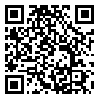Fri, Dec 26, 2025
[Archive]
Volume 8, Issue 3 (Summer 2022)
JCCNC 2022, 8(3): 159-166 |
Back to browse issues page
Download citation:
BibTeX | RIS | EndNote | Medlars | ProCite | Reference Manager | RefWorks
Send citation to:



BibTeX | RIS | EndNote | Medlars | ProCite | Reference Manager | RefWorks
Send citation to:
Ghavami N, Haghani S, Borimnejad L. Loss to Follow-up After Newborn Hearing Screening and Its Related Factors. JCCNC 2022; 8 (3) :159-166
URL: http://jccnc.iums.ac.ir/article-1-358-en.html
URL: http://jccnc.iums.ac.ir/article-1-358-en.html
1- Department of Pediatric and Neonatal Intensive Care Nursing, School of Nursing and Midwifery, Iran University of Medical Sciences, Tehran, Iran.
2- Nursing Care research Center, Iran University of Medical Sciences, Tehran, Iran.
3- Nursing Care research Center, Iran University of Medical Sciences, Tehran, Iran. ,borimnejad.l@Iums.ac.ir
2- Nursing Care research Center, Iran University of Medical Sciences, Tehran, Iran.
3- Nursing Care research Center, Iran University of Medical Sciences, Tehran, Iran. ,
Abstract: (2912 Views)
Background: Hearing loss is one of the most common birth defects and early detection of this disorder at birth is not possible without hearing screening. The aim of this study was to determine the frequency of loss to follow-up after neonatal hearing screening and its related factors in Khorramabad, Iran.
Methods: This retrospective correlational study was conducted from March 2018 to February 2021. The medical records of 13,710 infants born in this period were assessed. All the infants suspected of hearing loss in the first screening of one or both ears (n=310) were followed up for the second screening. The demographic and medical information of the infants and their parents was collected by a valid researcher-made checklist. The initial and follow-up data were extracted from the infants’ electronic records available at Assalian Hospital and the information available at the Dabbagh Clinic, respectively. To analyze the data, frequency distribution was determined and the relationships between the variables were assessed by the Chi-square test using SPSS software v. 16. The significance level was set at α=0.05.
Results: Out of 13,710 neonates, 310 cases (2.26%) did not pass the first hearing screening. Of this group, 60 infants (20%) missed the second screening follow-up. Among the studied variables, a number of socio-economic variables and neonatal factors were associated with not following hearing loss screening (P<0.05). Among the mothers’ personal causes of loss to follow-up, the feeling of no need to follow up with 36.7% and fear of COVID-19 with 26.7% were the most common causes.
Conclusion: About one-fifth of infant hearing screening follow-ups were not performed, which makes education about hearing screening follow-ups necessary for families. Providing a suitable context to facilitate preventing developmental problems in children and save future medical expenses is necessary and this program is needed to be on the agenda of the Ministry of Health and clinics providing mother and child health services.
Methods: This retrospective correlational study was conducted from March 2018 to February 2021. The medical records of 13,710 infants born in this period were assessed. All the infants suspected of hearing loss in the first screening of one or both ears (n=310) were followed up for the second screening. The demographic and medical information of the infants and their parents was collected by a valid researcher-made checklist. The initial and follow-up data were extracted from the infants’ electronic records available at Assalian Hospital and the information available at the Dabbagh Clinic, respectively. To analyze the data, frequency distribution was determined and the relationships between the variables were assessed by the Chi-square test using SPSS software v. 16. The significance level was set at α=0.05.
Results: Out of 13,710 neonates, 310 cases (2.26%) did not pass the first hearing screening. Of this group, 60 infants (20%) missed the second screening follow-up. Among the studied variables, a number of socio-economic variables and neonatal factors were associated with not following hearing loss screening (P<0.05). Among the mothers’ personal causes of loss to follow-up, the feeling of no need to follow up with 36.7% and fear of COVID-19 with 26.7% were the most common causes.
Conclusion: About one-fifth of infant hearing screening follow-ups were not performed, which makes education about hearing screening follow-ups necessary for families. Providing a suitable context to facilitate preventing developmental problems in children and save future medical expenses is necessary and this program is needed to be on the agenda of the Ministry of Health and clinics providing mother and child health services.
Type of Study: Research |
Subject:
General
Received: 2022/02/19 | Accepted: 2022/04/12 | Published: 2022/08/1
Received: 2022/02/19 | Accepted: 2022/04/12 | Published: 2022/08/1
Send email to the article author
| Rights and permissions | |
 |
This work is licensed under a Creative Commons Attribution-NonCommercial 4.0 International License. |






